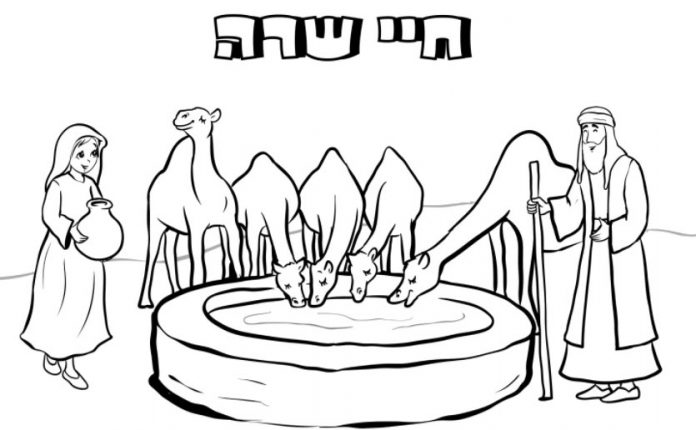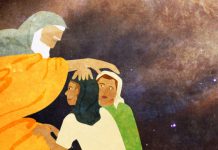Abraham Buries Sarah, and Arranges a Wife for Isaac
A True Story:
Rachel, the beautiful bride, peered nervously out the window. “When will he finally arrive?” she asked herself repeatedly. Today was the day she would wed the holy Rabbi Chaim of Sanz, whom she had never seen. They had been engaged for over six months, yet every time a meeting was scheduled, inclement weather or some other extenuating circumstance postponed their meeting.
Now the hall was filled with the greatest dignitaries in Galicia (Southern Poland), who had come from many miles to attend the wedding of the holy rabbi. Finally the moment arrived and a horse-drawn carriage approached the hall. Rabbi Chaim emerged from the carriage, limping like the hunchback of Notre Dame.
In a fury, the bride called for her father: “Why didn’t you tell me he was a cripple?” she demanded. Trying to calm her, he replied, “He is so learned, pious and holy, you won’t even notice his physical handicap.”
Unmoved, Rachel announced: “I refuse to marry him!”
Imagine the chaos as word spread that the bride was backing out. In order to avoid this embarrassment, her relatives and friends (especially the caterer!) all tried their best to convince her, but to no avail.
Finally, the groom himself requested five minutes to speak with her privately. After they’d spoken for a few minutes, the bride turned to the crowd, smiling broadly, and announced that the wedding was on!
What did he tell her??
The Chasidim revealed: He quoted the Talmud that says, “Forty days before the formation of the embryo, a heavenly voice announces: So-and-so will marry so-and-so.”
The holy Rabbi Chaim told Rachel: “Forty days before you were formed, I heard the heavenly voice and requested to see my future bride. The image that greeted me was a baby whose legs were mangled. What a sad thing for a girl to be handicapped for life. So I prayed that I would take the handicap in your stead.”
“Matches are made in heaven” is the theme of this week’s Parsha. The marriage of Isaac and Rebecca teaches us many Torah values and insights with regard to love and marriage.
THE DEATH OF SARAH
The Parsha begins with the death of Sarah. According to tradition this occurred as an immediate result of the “Akeida” (Binding of Isaac). The Midrash says that Abraham told Sarah he was taking Isaac to study Torah in Hebron. (Now we understand why he rose early, before she could change her mind!)
When the news came to their home in Be’er Sheva that Isaac had been taken to the altar, Sarah raced to Hebron to check on him. (This explains why she died in Hebron.) The message she received was: “Your husband Abraham has tied Isaac on the altar as a burnt offering…” Yet before Sarah could hear the rest of the message – that Isaac was safe – she passed away. She was so emotionally connected to Isaac that she couldn’t bear the thought of his death.
“And Abraham came to cry and eulogize his wife Sarah.” (Genesis 23:2)
Question: Where did Abraham come from? And what was his eulogy?
Answer: The sages explain that Abraham arrived from the “Akeida” to find Sarah dead, a direct result of his great deed. This was another test for Abraham: Would he regret his good deed and thus lose the merit (just as regretting evil deeds removes the punishment)?
Abraham did not regret, and this reaction formed the essence of the eulogy: the fact that Sarah had a husband and son who were ready to sacrifice everything to God. This was the greatest eulogy she could have!
THE CAVE OF MACHPELAH
The Midrash says that when Abraham was ready to slaughter the calf for his guests (see Parshat Vayeira), the calf ran away. Abraham chased it all the way to the cave of Machpelah in Hebron. When Abraham entered the cave, he found there the graves of Adam and Eve. It was then that he decided he wanted this holy place for his family burial plot.
In a famous negotiation, Abraham tried to buy the Machpelah cave from Efron the Hittite. The 19th century commentator Malbim explains that although Abraham’s neighbors respected him greatly, they refused to confer upon him the legal status of citizen, and the law stated that only citizens could purchase burial plots.
The Hittites offered Abraham a nice gravesite for Sarah, saying, “No one will hold back his grave from you, to bury your dead” (Genesis 23:6). Their intent was to say: “The land is ours, but we will grant you a grave in our plot.”
After bowing to express appreciation for their generosity, Abraham explained that in his view, not to bury loved ones in a family plot would be equivalent to abandoning the corpse. He then provided them with a legal loophole: Don’t sell me the cave, just “give it to me” (as a present), and of course I will recompense you — “with full money shall he give it to me” (Genesis 23:9). This would avoid the legal question of selling to non-citizens.
All Abraham wanted was the cave, and he stressed that it was located at the end of the field, as not to disturb Efron’s farming. Efron politely replied, “I have given you the field and the cave” – emphasizing that it was a package deal, so if you want the cave you have to buy the field as well.
At this point Abraham showed some silver coins and said, “Please take my money already” (Genesis 23:13) – i.e. in my eyes it is as if you have taken it already.
Efron’s greed took hold: “My master, for the measly sum of 400 silver shekels (the average annual income was about 10 shekels), why make such a commotion between such good friends?” (Genesis 23:15 – Rashi)
Abraham paid the money in full, with absolutely no concessions or reductions; Efron even demanded totally marketable coins. Efron was the classic example of “Say much and deliver little.”
At this point, the field and cave actually experienced a spiritual elevation and became the possession of Abraham and the Jewish people forever.
It is noteworthy that Hebron was bought fairly by Abraham, as was Shechem by Jacob, and Jerusalem by King David, as recorded explicitly in the Bible. It is interesting that today these are the places of greatest contention with our neighbors!
A BRIDE FOR ISAAC
After coming so close to losing his beloved son Isaac, Abraham decided the time had come to marry him off. Abraham called his trusty Canaanite servant Eliezer and administered an oath. (Although Abraham trusted him totally to manage his finances, to marry off his son was a spiritual enterprise for which he wanted an oath.) Eliezer swore not to take a wife for Isaac from the Canaanite women, and not to return Isaac to live in the “old country.”
Rashi tells us that Eliezer also had an eligible daughter whom he offered, but Abraham declined, saying, “I am blessed and the Canaanites are cursed. That doesn’t make a good match.”
Question: Ideologically, shouldn’t the daughters of Abraham’s Canaanite disciples, such as Eliezer, have been much more desirable than the idolaters of Abraham’s hometown? Why bother returning home?
Answer: Ideology can be changed with the proper persuasion. However, character traits are inborn and extremely difficult to alter. The Canaanites were the children of Cham and Canaan, who were cursed by Noah, and for all of their good ideology they still retained Cham’s character. On the other hand, the family of Abraham had good character traits even if they did worship idols.
In a marriage, character traits should be the most important factor; ideology can change more easily.
ELIEZER’S MISSION: STEP-BY-STEP ACCOUNT
(1) Eliezer took 10 of his master’s camels (recognizable as such by their muzzles, which were only removed when they were in ownerless fields) and all of the wealth of his master in his hand. (Genesis 24:10)
Question: How could Eliezer take all the riches of wealthy Abraham in his hand? (“He’s got the whole wide world in his hands!”)
Answer: Abraham wrote a document (dated the day of Eliezer’s journey) bequeathing Isaac as his sole heir. Thus Eliezer held this document, representing all of Abraham’s wealth, in his hand.
(2) “He arose and went to Aram” (Genesis 24:10), with no mention of his traveling time. The sages say that Eliezer experienced a “miraculous shortening of the trip”; moments after departing, he arrived.
(3) “He rested the camels by the well toward evening” (Genesis 24:11). Eliezer had a bias and did not mind failing in his mission to find Isaac a wife, in order to give his daughter a chance. Yet Eliezer overcame these thoughts, and prayed to God to succeed in his mission for the sake of his holy master Abraham.
(4) Eliezer’s main problem was not who would want to marry Isaac. Every eligible woman wanted to be his wife, and every father would want to be related to the famous Abraham. But how was Eliezer to know who was the right one? He prayed and suddenly had a flash of genius: Whoever would offer to water the camels, had incorporated the principle of kindness into her life. This was a necessary requirement to join the family of Abraham.
(5) Eliezer had just finished his prayer, when Rebecca (the cousin of Isaac) came to draw water from the well. As she approached the well, the waters miraculously came up to meet her. She filled her pitcher with the family’s drinking water and was on her way.
(6) Eliezer ran toward Rebecca: “Please give me a sip of water from your pitcher!” (Genesis 24:17) Rebecca hurried to comply. “Drink my master!” she said to Eliezer, and he drank his fill. No sooner had he finished drinking, when Rebecca offered to water the 10 camels as well. (Genesis 24:19)
Question: Why was she suddenly so concerned about the camels?
Answer: Firstly, she had a technical problem. “How can I bring this drinking water home after a stranger drank from it? Maybe he isn’t healthy?” On the other hand, to spill out the water and refill it after his few sips would embarrass him publicly. What was Rebecca’s solution? Give it to the camels!
Secondly, this man had just arrived from a lengthy voyage. He was sitting near the well, yet lacked the strength to even draw water and drink. That’s why he asked her for water. If so, he certainly isn’t able to draw water for the poor thirsty camels!
(7) Rebecca performed a superhuman feat. The young girl made tens of trips to the well to water 10 camels (approximately 140 gallons each) until they were finished drinking. Obviously, this was not Rebecca’s first act of kindness. The Torah is not a history book and does not record every story. If she was capable of this act, she obviously had built herself up through many prior instances.
Question: Who was Rebecca’s mentor? Who inspired a young girl, living among idolaters, to develop such golden character traits? (The sages refer to her as “the rose in the thorn bush.”)
Answer: Abraham opened his tent to all wayfarers and preached to them about a loving God, who wants us to be kind to others. When these wayfarers came to the land of Aram, they visited Rebecca’s family and told about their Uncle Abraham and all of his kind deeds. Rebecca absorbed these stories, took them to heart, and decided to follow Abraham’s path by constantly doing kindness, culminating in this exceptional deed. (Rabbi Avigdor Miller)
(8) Eliezer, without asking questions, took out a gold nose ring weighing one “bekah,” and a necklace weighing 10 gold pieces. Rebecca informed him of her identity (as Abraham’s relative) and the servant immediately bowed to the ground and thanked God.
Rashi tells us that the ring was symbolic of the Shekel (silver coin donated to the temple for communal sacrifices) which weighed a “bekah,” and the 10 gold pieces corresponded to the Ten Commandments.
Question: What is their relevance here?
Answer: The Talmudic “Ethics of the Fathers” informs us that the world exists on three pillars: Torah, Divine service, and acts of kindness. Since Rebecca displayed tremendous acts of kindness, Eliezer informed her that her children would also accept the Ten Commandments (Torah), and bring offerings to the Temple (Divine service).
(9) Rebecca ran home to tell her mother. She showed off her gold jewelry and told everyone about the man who believed in God and thanked Him. Her brother Lavan (although his name means white, “there was nothing white about him except his name!”) ran to meet the stranger. Lavan thought to himself, “Look how much he paid for a drink of water, can you imagine how much he’ll pay for a night’s lodging?!”
Lavan exclaimed: “Come, blessed of God! I cleaned the house” (Genesis 24:31), by emptying it of idols (Rashi). Why is Lavan suddenly so righteous? He figured: If Eliezer believes in God and has a lot of money, then I’ll believe in God, too!
(10) Eliezer entered their home and was invited to eat. He proclaimed: “I cannot eat before I say my words” (i.e. wash my hands and recite the blessing, as well as the blessing on the bread). “I am the servant of Abraham” (i.e. we keep the Torah and cannot eat non-kosher food). (Genesis 24:34 – Baal HaTurim)
(11) Eliezer repeated the entire story of his meeting with Rebecca, and showed them the document (with today’s date, proving his ultra-quick journey), and requested the hand of Rebecca to marry Isaac. In case they didn’t agree, Eliezer again hinted about his own daughter.
Question: Hadn’t Abraham already told Eliezer, “I am blessed and you are cursed“? Why did Eliezer continue to mention it?
Answer: After Lavan blessed Eliezer with “blessed of God,” Eliezer now considered himself blessed.
(12) Rebecca’s family replied: “From God the matter has come forth” (Genesis 24:50), from which the Talmud derives “Matches are made in Heaven.” Judaism believes in Divine Providence in every aspect of life. God provides all our needs throughout life. In finding a marriage partner, God’s hand can be particularly seen.
(13) Lavan planned to poison Eliezer so he could take all his money. But an angel turned the table (Russian roulette), and Rebecca’s father Betual (who planned to delay the wedding) was poisoned instead. When Rebecca’s mother and brother then tried to delay matters, Rebecca herself said that she wanted things to move forward. We learn from here that the bride and groom must both agree to marry, and that parents may not force their will on a child.
Question: Why does the Torah tell the story of Eliezer at length – twice! – while otherwise the Torah is very particular about every word, and even important laws are often only hinted to?
Answer: The sages say, “God enjoys the conversation of the servants of the patriarchs (and certainly the conversation of the patriarchs themselves) more than the Torah of their children.” In God’s great love for our ancestors, He elaborates even on their mere conversations, more than the laws given later. (Of course, we can learn many lessons from these conversations!)
The whole point of the book of Genesis is to show us how the deeds of the ancestors plant the seed for their children.
RETURN TO ISRAEL
Eliezer returned to Israel with Rebecca. They mounted the camels and were home in a flash. Isaac was meditating in the field, composing the afternoon Mincha prayer. When Rebecca saw Isaac, she fell off the saddle. She refused to meet him when mounted, in order to stress their equality. She donned the veil to meet her groom. Isaac married Rebecca and loved her (in that order!), and the presence of God returned to the family’s tent.
The sages explain that as long as Sarah was alive, the bread that she baked stayed fresh all week. The candles that she lit stayed lit all week. Above the tent was a pillar of fire that represented God’s presence. When Sarah passed away, these miracles stopped – until Isaac married Rebecca, at which point the miracles returned.
This means that the first Jewish “temple” was actually the tent of the patriarchs, with the matriarchs acting as High Priests to keep the Divine Presence there. The subsequent Tabernacle in the desert and the Holy Temples in Jerusalem were continuations of that tent.
To this day, every married couple works to bring the Divine Presence into their home, and the wife is the guardian of its sanctity.
DEATH OF ABRAHAM
Abraham married Keturah (traditionally understood to be Hagar) and had six children and many grandchildren. During Abraham’s lifetime, he sent them off to the east. (Some say this refers to the Orientals who received spiritual powers from their father, but kept their distance from the children of Isaac.)
“And Abraham died at a ripe old age, an elder, and satiated with days” (Genesis 25:8). Abraham lived a miraculous life and his days were full of accomplishments. He made every day count while serving God. Ishmael repented during Abraham’s lifetime. Esav had not yet left the fold. The Jewish nation was on its way.
credit to Aish.com












